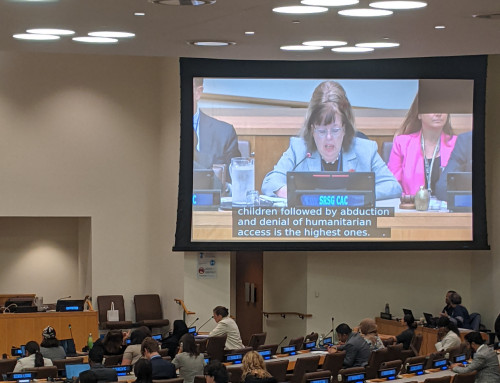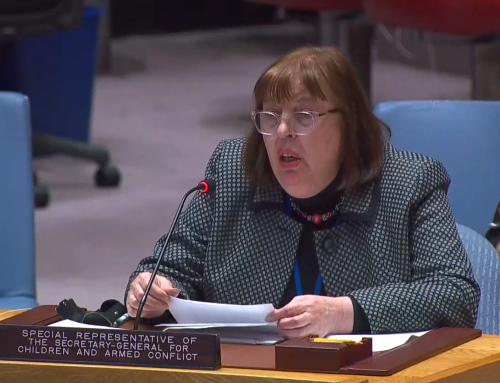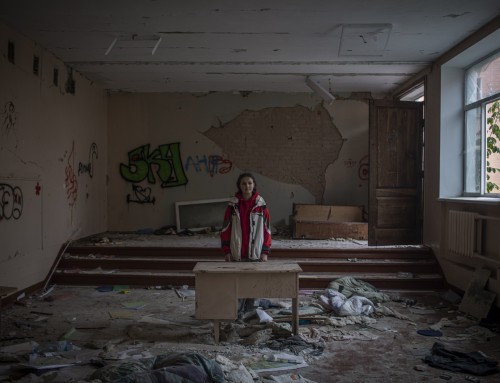1 June 2002
Democratic Republic of the Congo Speech
I have just concluded a 10-day mission to the Democratic Republic of Congo (DRC). The purpose of the visit was to assess first-hand the impact of the wars on children, in the context of my mandate and pursuant to the request of the Security Council contained in Resolution 1341.
I was able to visit different parts of the country, including the provincial cities of Goma, Bukavu, Bunia, Kisangani and Kananga. In Kinshasa, I met with President Joseph Kabila and several government ministers; I also met with leaders of the principal political parties and members of the diplomatic community. In Goma, I met with the leadership of Rassemblement Congolais pour la Démocratie (RCD), headed by its president, Mr. Adolphe Onusumba. In Bunia, I met with the leadership of Front de Libération du Congo (FLC), headed by its president, Jean Pierre Bemba.
Everywhere I went, I held discussions with political and military authorities, local and international humanitarian NGOs, civil society, religious leaders and UN agencies. Throughout the country, I met and heard directly from different groups of war-affected children and their families.
The direct and indirect impact of the wars has taken a very heavy toll on children, in a country where 50% of the population of 49 million are children under 16 years of age.
Consider the following examples of direct and indirect impact of the wars on children:
The vast majority of the 2 million people displaced by the wars within the country are children and women.
Hundreds of thousands of children suffer or have died from severe malnutrition and preventable diseases because of conditions created by the wars. According to a recent study by International Rescue Committee, since the outbreak of hostilities in August 1998, there have been 2.5 million 'excess deaths' (above the number normally expected) in Eastern DRC, the majority of the victims being children. In some areas, such as Moba and Kalemie, an estimated 75% of children born during the conflict have perished or are expected to die before they reach the age of two.
Most families subsist on less than one dollar a day.
40% of the country's children are seriously malnourished, and 16 million people have critical food needs.
In the past 10 years infant mortality has doubled.
More than half of the children of school-going age are not in school.
The incidence of child labour (especially at mining sites), child prostitution and street children have sharply increased.
There is the particular and silent trauma of girls exposed to sexual abuse and HIV/AIDS in the corridors of the wars, and forced to serve as concubines by soldiers of various affiliations.
Everywhere I went, I received consistent reports of massive recruitment and use of child soldiers.
There is an urgent need for a plan of action to address the grave situation of children in the DRC. I should like to put forward the following recommendations for your consideration:
Placing child protection on dialogue and peace process agendas. Child protection and rehabilitation must become a national and sub-regional political priority, and should figure prominently on the agenda of the inter-Congolese dialogue and the peace process in general.
Expand MONUC's presence and humanitarian activities. The role of MONUC is greatly appreciated by the Congolese people. The arrival of the military contingent and military observers in particular has had a striking impact on the local populations. Three elements seem to have particular resonance for the local communities: their sheer presence is bringing much-needed confidence and reassurance to the local populations, allowing them to begin picking up the pieces of their shattered lives; their facilitation of and engagement with humanitarian activities; and their association with the protection of children. I would strongly recommend the expansion and strengthening of MONUC's activities in these three areas, which directly benefit the local populations and further enhance the credibility of the United Nations.
Provide adequate and sustained resources for long-term protection. The primary responsibility for ensuring the wellbeing of children, and therefore the future of the country, rests with the Congolese leaders; I have urged them to assume this responsibility fully. Today I appeal to the international community to reach out to the Congolese children, who have suffered incredibly, and unjustly with concrete assistance, focusing particularly on rehabilitation of schools and health care centers, and the provision of much-needed resources for the demobilization and long-term reintegration of child soldiers. These measures are necessary to break the present cycle of despair and exploitation. They will also serve as means of protection, rehabilitation and prevention.
End child soldiering. The massive recruitment and use of children as child soldiers has become a plague that is steadily destroying the fabric and future of the Congo and that entire zone of Africa. Children belong in schools, with their families and with their communities, not in the battle fields. I have therefore proposed the following five-point program of action for ending child soldiering; this has been accepted by all political and military leaders in the DRC:
A complete stop to all recruitment and participation in armed groups and forces of young persons below the age of 18.
Establish a mechanism to monitor and report on compliance with the above commitment.
Organize a major public awareness campaign to sensitise the military, civil society and local communities.
Undertake joint visits (by MONUC, UNICEF and military authorities) to military camps and barracks.
Establish necessary programs for reception, demobilization, rehabilitation, and reintegration of child soldiers.
In this connection, a very important and welcome development was the Government's announcement during my visit that it has just ratified the Optional Protocol banning the participation in war of young persons below the age of 18. DRC is the fifth country to ratify the protocol. I warmly congratulate the Government and people of the DRC on this action.
Ensure attention to the special needs of girls. A special programme is needed to address the special needs of sexually abused and exploited girls, including their health needs, a campaign of sensitization of local communities, and trauma counseling. This is all the more important in view of the social stigma and reticence which usually inhibits acknowledging and attending to their needs.
Improve data collection, monitoring, and reporting. We need to strengthen and coordinate a network for more effective information and data collection. What I saw in the DRC demonstrates more than ever, the need for more systematic data and information collection on the impact of war on children and on the most effective means and methods to intervene for their protection and rehabilitation. The international community, working closely with local and civil society organizations, needs to establish a network ( a kind of “Children's Observatory”) to monitor the conduct of the parties in conflict relative to their obligations and commitments for the protection of children.
No impunity for perpetrators of crimes against children. Those responsible for atrocities and sexual violence against children, and recruiting, and using children as child soldiers must be held fully accountable for their actions and crimes.
Training in child protection for UN peacekeeping personnel. Member States contributing troops should take steps to ensure that the military personnel destined to join MONUC are provided with adequate training, particularly concerning respect for and protection of the rights of children and women, prior to their deployment to the mission area. Continuous reinforcement training and guidance should then be provided by MONUC for all peacekeeping personnel.
Sub-regional approach to child protection. We need a “neighbourhood initiative” to promote child protection and advocacy at the sub-regional level. Child soldiering has become a cross-border and sub-regional danger for children. Children are being recruited and abducted in the DRC, taken to neighbouring countries for training and then brought back to fight in the Congo. Similarly children are being recruited and abducted in the neighbouring countries and taken to fight in the DRC. A sub-regional initiative is needed to address and remedy this phenomenon, as well as trafficking and cross-border displacement of children.
Build local capacity for child protection and advocacy. I encourage the United Nations system and other international actors to do more to link our efforts more closely with local actors; this is the best way to build local capacity for protection and advocacy. I was very encouraged by the vigor and commitment of civil society throughout the country.
Take measures to end the plunder of natural resources. Everywhere I went the children and their parents called for an end to the war and an end to the plunder of natural resources of the DRC. The widespread and systematic looting of diamond, gold, coltan, timber and coffee from the DRC, by all concerned, is a disgrace which is entirely unacceptable; this is robbing the Congolese children of their birthright, of resources that should be used for their education,
The children of the DRC look to the Security Council for decisive measures to end the plundering of their natural resources.
I look forward to working closely with the Security Council, MONUC, UNICEF and other agencies and NGOs to follow-up on these recommendations and issues.
In conclusion, may I say that I was particularly impressed and encouraged by the commitment of all sectors of Congolese society to preserve their national unity, by the strength and engagement of civil society throughout the country, and by the resilience and determination of local communities and the youth.
A united, peaceful and vigorous Congo is good for Congolese children; it is good for the development and future of Africa; and it is good for international peace and security.





